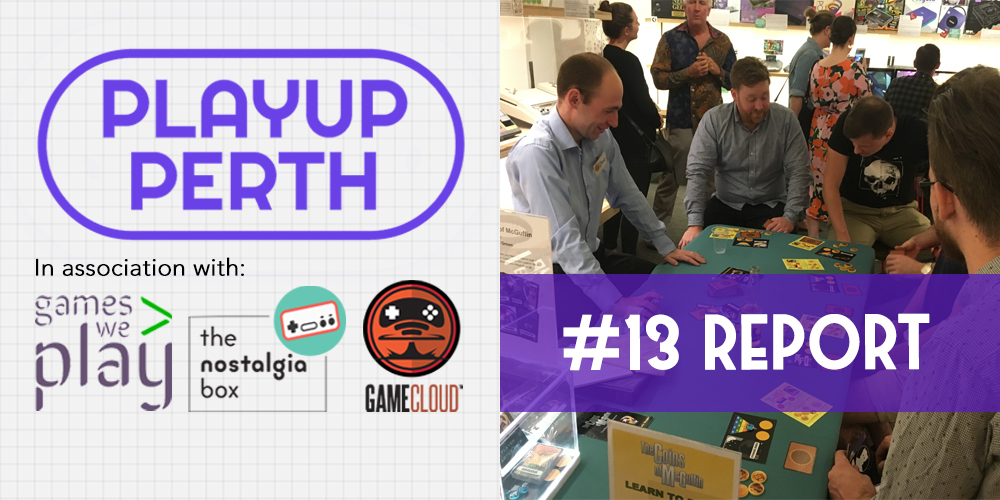
It’s almost painful to think that the last Playup Perth was over six months ago. Thankfully, Playup is back and ready to make a more significant mark on the local scene. The brand has updated its look and teamed up with the City of Perth to provide more to the gaming community than just an area to playtest.
An exciting addition to Playup’s long record of supporting the local scene came in the form of creative microgrants. Three games that were tasted at Playups were eligible for two $500 and one $1000 grants. While it’s far from enough to live off (which isn’t the point), it’s a step in the right direction for getting more support here in Perth for game developers. Congrats to Kim Larking (Banishment), Hien Pham (It Will Be Hard) and the grand prize winners, Daisy Ale Soundworks (Lost & Hound) for their hard earned winnings!
Of course, it’s not all about winning money. Playup gets developers in front of fresh eyes to help test out their games as well as exposing the public to what the local scene has to offer. This time around, it was a great showing of games, and I think everyone got as much out of it as they could have asked for.
Lost & Hound (Daisy Ale Soundworks)
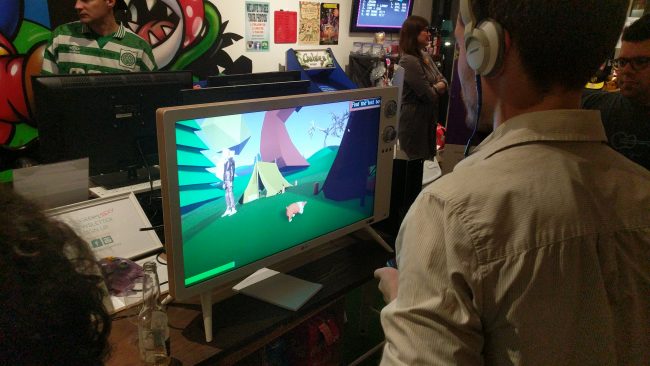
We often take for granted that many people can’t play games the way most of us do. Lost & Hound was built from the ground up for blind gamers, which there are (apparently) a surprisingly large number of! The game puts you in the paws of a regular ol’ dog that uses their heightened sense of smell to track down a lost child. The tricky thing about the game, however, is that there’s no visual trail to follow, so your sense of smell is represented through smart audio design.
When you’re on the trail, you’ll hear an ominous hum. If you’re going the right way, the sound is centred, but if you go the wrong way, the sound pans left or right to get you back on track before fading away. There were elegant twists with the idea in the game, like having to cross a river and find the scent on the other side before moving on. I’d like to have seen a bit more added to the game to keep me engaged, but as far as core ideas go, this is worthy of a dog treat.
Baron (Dogmelon)
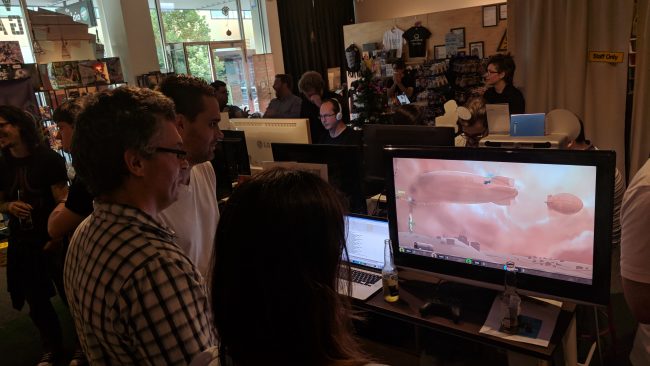
I’m not much an animal guy, but dogfighting dogs might be the best pitch I’ve heard in a long time. Baron is a simple 2D dogfighting game made for experienced gamers and newbies alike. You take off, start shooting each other down and collect coins along the way. Each round, you can upgrade your firing rate and try out special weapons, but I felt that the game’s subtleties were its strongest component.
It’s often easy to make a nice little game and put it away, but there was a lot of effort put into how Baron played. Flying upwards for long periods slowed you down, and it was possible to stall your bi-plane if you weren’t careful. The intricacies that came in handling your plane made the whole game a lot more enjoyable than a more stripped back approach. Some of the special weapons were a little too powerful, but for a little party game, Baron hits the mark.
The Coins of McGuffin (David Green)
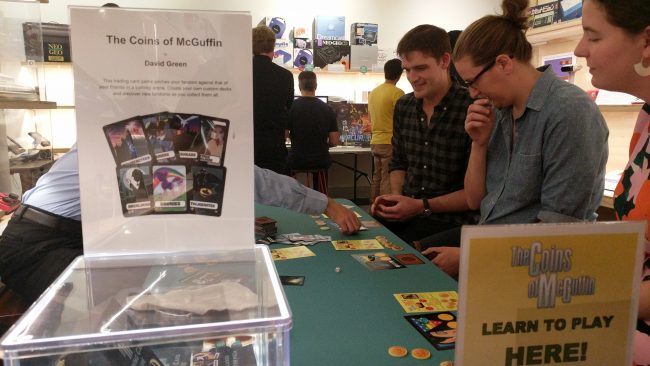
TCGs are taking over the world, even Final Fantasy’s taking a crack at it, but only in Perth would you find a TCG about FF’s fandom. The Coins of McGuffin is a game all about fandoms, from Trekkies to Swifties with a dash of Twihards for good measure. You use fandom cards in conjunction with thematic coins (like film or books) to gain hit points in the hopes you can stay alive the longest.
For a game full of light-hearted classifiers, there’s a tremendous amount of strategy to dig into. Do you attack the guy with the most health or the small fry in the back who holds a commanding coin collection? You can even form unofficial alliances to bring down the bigger threat, just don’t expect to be friends when it’s you against them. It might not be Magic, but that’s also a good thing, and why not support a local TCG for once?
Blind Heist
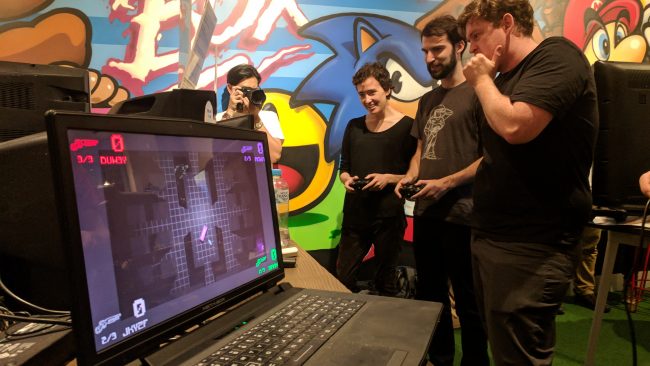
You generally want the player to know where they are in a game, but if you’re playing Blind Heist, you might not. The game uses lighting to conceal your position from other players, allowing you to move through dark areas without revealing where you are. It’s a bit like playing hide and seek with Schroedinger’s cat and a shotgun, and man, I liked how this game played.
Despite its simplicity, the core idea of the game revolved around deception. If you could make your opponents think that you were hiding around the corner when you were miles away, you had the upper hand. The main problem was that you could also just nullify your opponents by camping at the ammo drops, but the dev seemed aware of that already. I’m keen to see where the game goes, assuming it doesn’t stay hidden in the shadows.
Merchants & Mercenaries (Echidna Games)
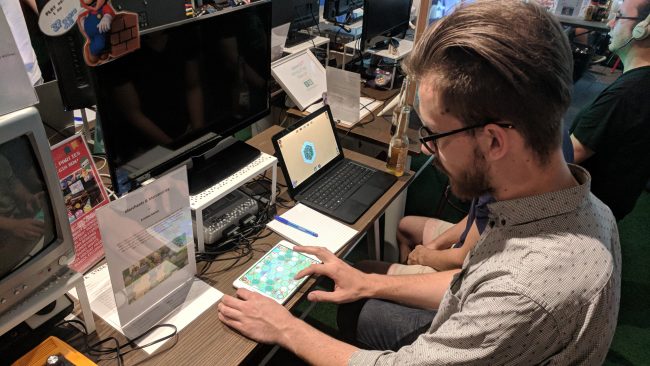
There are days where you don’t feel in the mood for a video game but can’t organise a good board game to play with anyone. Merchants & Mercenaries brings together the best of both worlds, combining elements from board games with real-time strategy games. You play on a randomised board filled with individual hexes, gather resources over time and eventually dominate the board with your mighty empire’s growth.
Unfortunately, I wasn’t able to give the game a try on the night. Before you go crying, “But Nick, that was your one job!” I couldn’t try it because too many people were playing it all night. Shame as it was, at least the developer was getting plenty of chances to see how people play this game!
Inti (Jose Zamalloa)
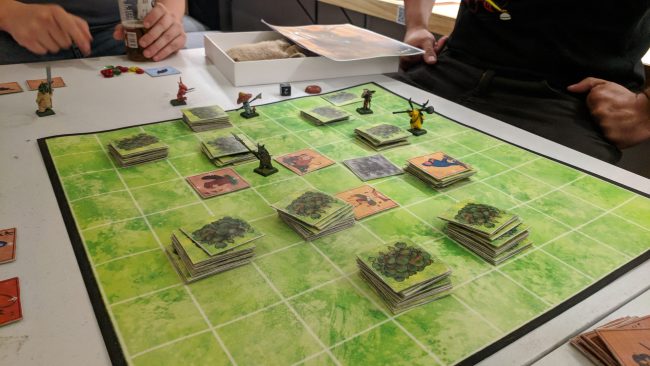
Hiding away in a world of its own was Inti, a fantasy board game crafted by the developer and his son. You play as a forest spirit trying to heal your favourite tree by collecting four Inti stones. As you move around the board and forage for resources, the forest moves in turn, sometimes in your favour and other times completely wrecking your plans.
The game comes across as very basic, but after a few turns, the board starts becoming very interesting. You have to start thinking further ahead, taking into account where thieves and merchants might or might not move to. Add in trading and quirks when you start getting Inti stones, and you’ve got a game any forest spirit would play.
Mercury Blue (Turbo Chimp)
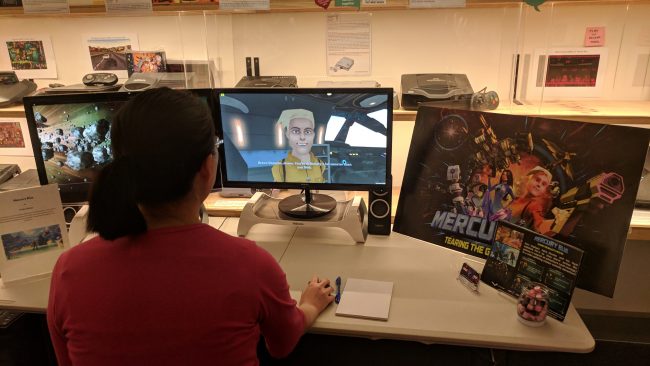
Take the wacky point n’ click games of the ‘90s and colour them through the lens of Telltale offerings and you’d end up with Mercury Blue. The game follows the tale of Jake Hunter and his robot sidekick, FU-2, as they seek revenge on the tyrannical Conglomocorp. From the brief demo I played, there were zany adventures and comical mischief, but I had a lot of feedback for the dev.
The great thing about Playup Perth is that you can talk to the devs about their games as you play them. I chatted with Simon for a long time about what was going on in his game, some good and some not so good, but he was open to everything. The atmosphere of Playup is chill enough to facilitate dissecting a game without having to argue with the people you’re talking to. Hopefully, we’ll see the game at another Playup, and I’m sure I’ll have plenty more thoughts to give then!
Working Class Weyland (Liam Kinsella)
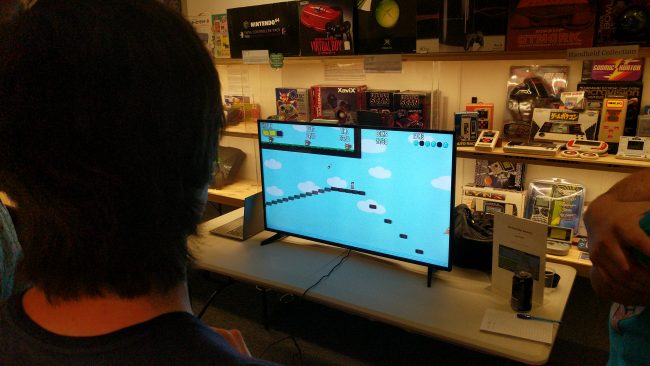
Parodies and platformers aren’t the most common mixture, but games like I Wanna Be The Guy show that it’s far from impossible. Working Class Weyland is putting Perth swing on the genre, and it will feel immediately familiar to just about everyone. The game is a standard platformer in terms of mechanics, but it’s everything around the mechanics where the parody comes in.
For a start, the game is all about finding your ex-wife and making her pay up those damn payments. The levels are designed ‘intentionally poorly’, which means you’ll be laughing through the pain of a game outsmarting you. There’s certainly potential for a great game here, and I’m hoping to see more devilish gameplay at future Playup Perths.
 
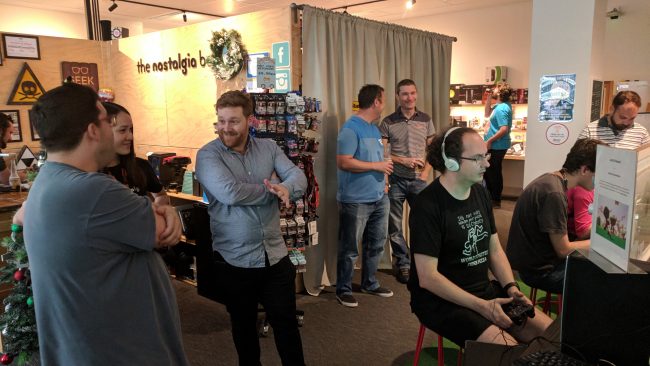
Playup has been gone for a while now, but it hit back with a vengeance. Great games, pleasant atmosphere and open devs made the night another successful event in my eyes. Congrats again the winners of the microgrants, and here’s to more of them in future. Oh, and more Playups too, of course.











